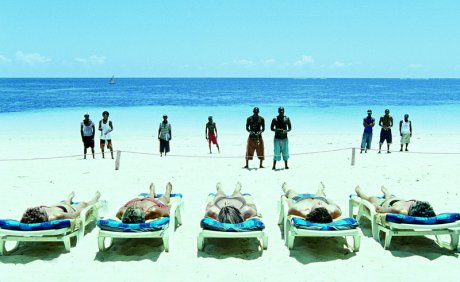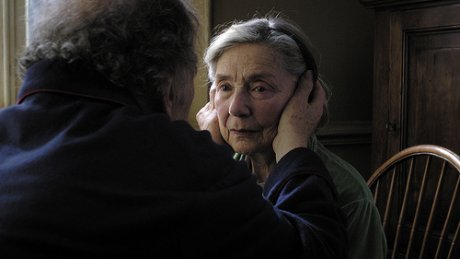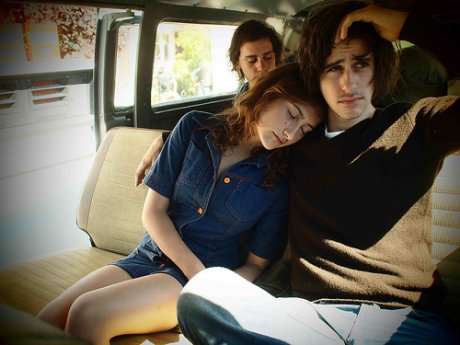From Nov. 1-8, the American Film Institute hosted AFI Fest in Hollywood and, with the help of wonderful sponsors like Audi, has for the fourth consecutive year offered free tickets to all of the 150+ films screening at the festival. Benefitting from the 20/20 hindsight of festival-goers attending the year’s earlier major fests such as Cannes, Toronto, and New York, AFI Fest is essentially the West Coast’s best opportunity to catch up with the year’s finest international releases along with an eclectic mix of American indies, genre films, and midnight madness. While 2012’s festival didn’t have quite as many major directors and actors showing up for Q & A’s, it was once again a remarkably well-organized and efficiently run affair, especially considering the potential insanity inherent in offering free tickets and rush lines for all of your films. Below are the highlights of my festival experience, including a couple of nice surprises that helped to transform what had before been a relatively lackluster year of cinema into one that’s at least respectable.
Leviathan (Lucien Castaing-Taylor & Verena Paravel)

My new favorite film of year, co-directed by Sweetgrass director Lucien Castaing-Taylor and Verena Paravel, Leviathan is a difficult film to describe, but if you imagine an episode of The Deadliest Catch as directed by Stan Brakhage, you’re on the right track. Shot with an array of tiny cameras on a commercial fishing boat off the New Bedford coast, the film captures the brutal realities of life at sea in a terrifyingly visceral, kaleidoscopic montage of perspectives. Shots, with cameras attached to wires, chains, nets, and the fishermen themselves, take us up and down the ship, put us in the pits among the freshly captured and sliced-up fish, plunge us in and out of the ocean, and soar us into the sky amidst the seagulls, creating a visual abstraction that changes what would typically be an observational documentary into a purely physical and experiential avant-garde piece. If given the chance, this is not to be missed on the big screen.
Paradise: Love / Paradise: Faith (Ulrich Seidl)

Like his equally brilliant Import/Export, Ulrich Seidl’s Paradise: Love, the first film in his Paradise trilogy, seamlessly melds devastating social conditions and dispassionate sexual encounters to deadpan humor and sharp satire. Set mostly in Kenya, where a 50-year-old Austrian woman travels as a sex tourist, the film operates with equal aplomb as a metaphor for Western imperialism and an intimate character piece exploring the depths of a woman’s loneliness and her inability to fill that void with anything within her power. The exotic locale and explicit sexual content are rendered flat and lifeless through Seidl’s dispassionate eye and schematic staging, but the film is nonetheless intensely emotional and surprisingly funny. The mutual exploitation of the woman/West and Africans is portrayed with such vibrancy through the astounding performance of Margarete Tiesel, who conveys tenderness and viciousness with equal skill, and portrays the hypocrisy of her character with a careful balance of pathos and ferocity. Seidl’s work with all of these dichotomies is remarkable, and this film makes it easy to see why he’s one of Werner Herzog’s favorite working directors. Faith, the second film in the Paradise trilogy, may not be as effective as its predecessor, but its story of a recently converted fundamental Christian woman and her now-handicapped Muslim husband returning after a two-year absence is still quite good and contains a unique combination of ascetic ritualism, deviant sexuality, and brutal critique of the absurdity of religious fundamentalism. Seidl’s dry humor and brutal take on human interactions is present here as well, and as obvious as the subject matter may seem on paper, the director takes the material into surprising and unsettling territories, mining psychological and philosophical truths from within the confines of an unconventional yet naturalistic relationship.
Tabu (Miguel Gomes)

Miguel Gomes’ odd and intriguing love story starts off like a typical, slow-burning Eastern European drama centered on the struggles of a curmudgeonly old woman, her maid, and her kindhearted neighbor before drastically shifting gears into a delicate, sweet yet unsentimental retelling of the woman’s youthful dalliances in Africa. In what essentially transforms into a silent film in one respect (none of the dialogue is heard) is in another respect a truly experimental aural, sensory experience. The lack of dialogue heightens the characters’ connection to nature and their surroundings while also intensifying the drama through its dreamlike atmosphere. The crisp black-and-white cinematography captures the stark contrasts of modern-day Lisbon, with its rigid angular architecture and the lush fluidity of Africa. For a film that easily could teeter on the edge gimmickry or preciousness, Tabu is especially striking in its knack for grounding the ethereal in the real, its paradise lost remaining tangible and full of genuine passion and emotion. Gomes is a talent to watch out for, possessing an original voice and eye for detail.
Amour (Michael Haneke)

Perhaps the most divisive of all acclaimed international directors, Michael Haneke throws a small bone to his critics who find his films overly academic and devoid of life with Amour. Haneke’s second straight to win the Palme d’Or at Cannes, Amour tells the story of a couple struggling to deal with increasingly crippling dementia. The awards and positive critical response couldn’t quite squash my fear that Haneke would make the film either too sterile or sentimental, but his ascetic style lends itself perfectly to a subdued take on the troubles of aging and losing the capability to do the things one loves to do. Emmanuelle Riva and Jean-Louis Trintignant are as lovely and convincing as word-of-mouth has led us to believe, as they so effortlessly sustain the organic ebb-and-flow of a couple who have been together for decades, both in their understated sweetness and restrained bursts of viciousness. Throughout the film, neither character sheds a tear; rather, Haneke methodically tracks the wife’s inevitable descent into dementia and, with a watchful eye, covers a wide range of emotional terrain through her interactions with her husband as well as her distant yet well-meaning daughter. What the film lacks in Haneke’s usually impressive formal rigor, it makes up for with truly earned emotional truths and as the director’s mother suffered a similar fate as Anne’s, one senses the subject matter affects the director on a more humane than intellectual level and, fortunately, the film is all the better for it.
Like Someone in Love (Abbas Kiarostami)

Abbas Kiarostami’s loose companion piece to the spectacular Certified Copy, Like Someone in Love once again is initially centered on the seemingly innocuous conversations of a man and woman that lead to progressively shocking and unexpected results. Kiarostami’s obsession with artifice is on full display here – a prostitute’s john, an elderly academic, is confronted by the woman’s fiancé, who takes the man to be her grandfather. From there, Kiarostami allows the duality of the couples’ roles/relationship (prostitute/john and grandfather/granddaughter) to playfully intertwine as they are further complicated by the intrusions of the man’s peering neighbor and an ex-student, who each unknowingly threaten to disrupt the twosome’s improvised scheme. While the film doesn’t have the complex ambiguity and thematic richness of its predecessor, it is a charming and unique addition to the Kiarostami canon.
The Rest

It’s hard to trust my initial opinion of Holy Motors, as a two-hour delay in the screening and projection issues put a damper on what may have been a great experience. It’s offbeat, wonderful at times, and unabashedly French. For now, I defer to Daniel Sargeant’s review, which touches on much of what impressed me. Olivier Assayas’s Something in the Air, set a few years after May 1968, is as personal as anything the director’s made since Cold Water and, like most of his work, effortlessly creates a believable cinematic world, but unlike his recent greats, Carlos and Summer Hours, individual sequences are more effective than the scattershot whole. It’s quite enjoyable, simply less consequential than his other recent films. Joe Swanberg’s All the Light in the Sky has a breezy, unassuming nature about it, yet all director Joe Swanberg’s characters feel fully realized and multi-dimensional, even ones given only a few scenes. It’s a good little character piece, even if it doesn’t leave much of a mark. I despised Carlos Reygadas’s first two films before quite liking Silent Light, despite its egregious Bergman/Dreyer aping, but Post Tenebras Lux puts me back on the defensive. It does have the year’s most impressive opening shot, even more stunning than that of his previous film, yet as beautiful as its cinematography is, it’s too shapeless and meandering to work as a cohesive whole. The less said about Matteo Garrone’s Reality, the better. Why the director of the impressive Gamorrah would follow up that festival and critical darling with a comic attempt at taking reality television to task is beyond me. It’s neither funny nor insightful, and though the final sequences are memorable, it’s hard to forgive a tepid satire for being more then 10 years late.
